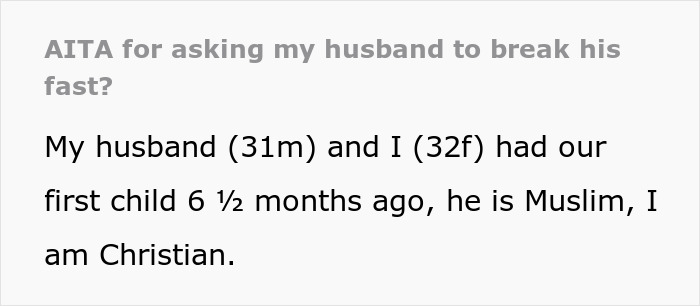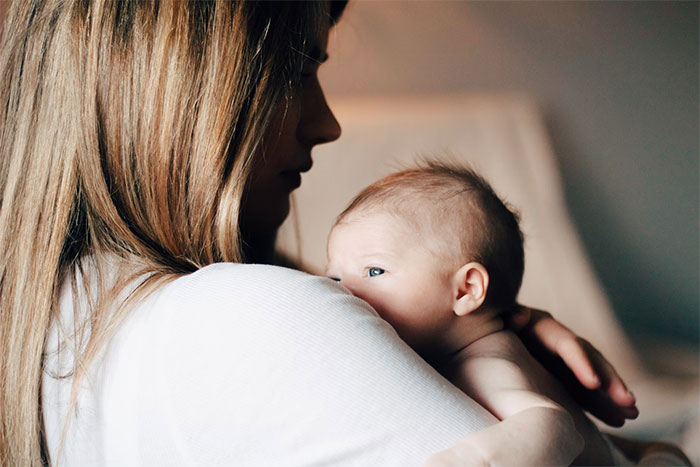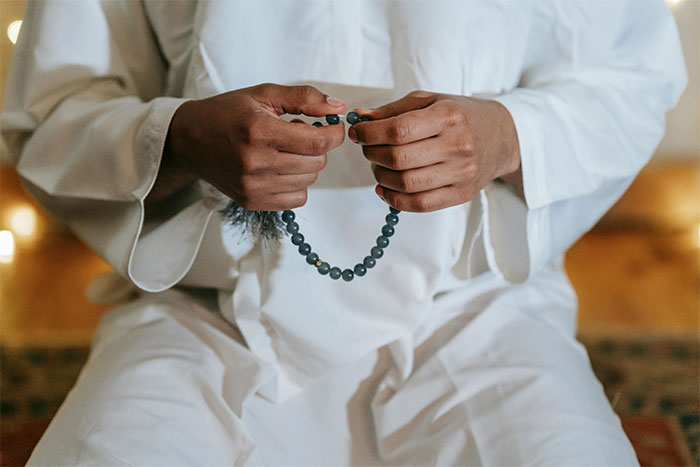Mom Asks Husband To Stop Fasting During Ramadan And Help With The Baby
Marrying outside one’s religion is becoming more and more common, with the number of Americans having a spouse of a different faith on a steady rise since 2010. While it’s a great opportunity to learn and bond over something new beyond your lifestyle, some partners might find it challenging to manage the dynamics of interfaith marriage.
One thing this Christian wife struggled with in the relationship with her Muslim husband was fasting in the month of Ramadan. During it, he must abstain from eating, drinking, and smoking from sunrise to sunset. The arrival of a new baby also meant that this was going to be much more challenging without nicotine, caffeine, water, and food in the parent’s system.
Scroll down to find the full story and a conversation with the original author and a couples therapist, Jeremiah Gibson, who kindly agreed to tell us more about mixed-religion households.
Marrying outside one’s religion might present unique challenges in a relationship
Image credits: Michael Burrows / Pexels (not the actual photo)
This Christian wife felt like a single mom when her Muslim husband was fasting and refused to help her
Image credits: Hollie Santos / Unsplash (not the actual photo)
Image credits: Unusual-Desk-4700
As their daughter got older, the Ramadan period got easier
Bored Panda reached out to the original author of the story who kindly agreed to tell us more about it. Naturally, we were curious to know what inspired her to share it online. She told us that a mix of Ramadan and having a newborn baby made it difficult to go to friends or family for support, so she decided to post it anonymously to better understand the husband’s perspective.
Two years have passed since she wrote about her situation on Reddit, so this begged the question of whether they were able to find ways to make the Ramadan period easier on themselves, especially with a small child. She let us know that “As our daughter has gotten older it has just simply become easier.” She also mentioned that the husband wasn’t fasting this year (per his decision), which might have helped the situation as well.
She concluded by saying that there’s really no relationship without difficulties whether it’s an interfaith one or not. And for her, the challenges that they go through are still a big learning curve.
Interfaith marriages face more challenges especially when they lack effective communication
We also contacted Jeremiah Gibson, a couple’s therapist, and co-creator of the Sexvangelicals educational platform that takes discussions about religion, sexuality, gender, and race to the next level. He kindly agreed to tell us more about mixed-faith couples.
He believes that such partners can certainly face more challenges than those being of the same faith, especially if the individuals struggle to talk calmly and effectively about the values and traditions of their religious cultures.
Gibson further explains, “Religious communities that are more insular, more legalistic, and less trusting of outside groups are more likely to demand uniformity, obedience, and performance of gender roles, which leads to a greater number of social consequences for dating and marrying outside of the preferred social/religious groups.
Folks who grow up in Evangelical Christianity, Orthodox Judaism, and Sunni and Shiite Islamic communities may experience more external pressures around interfaith marriages than people in Reformed Jewish, United Church of Christ, and other more progressive religious communities.
These people also are taught communication skills centered around conformity and repression of individual needs, which creates additional difficulty in communicating needs in a couple/marital context.”
Despite the challenges, balance and peace can be created in mixed-religion households
Gibson also mentions that these couples often find themselves in a two-choice dilemma. They can choose family, which includes parents, ancestors, nation, and the deity itself, or choose a person from a different faith tradition.
“But, for many folks, despite their best efforts, they cannot have both. Both choices come with an immense amount of anxiety, coercion, and ultimately, grief and loss, which, if not careful, can get presented as anger and criticism toward their partner for their unwillingness to change. This can become especially problematic if there’s an unspoken (or spoken) desire from one partner to convert the other partner to their religious belief system and ensuing community,” he adds.
However, partners who support each other can come up with strategies to create balance and involve elements, beliefs, traditions, foods, and languages from both families that best represent them.
Gibson illustrates this by saying, “For instance, an interfaith couple may decide to fast together as a family during Ramadan and open presents on Christmas Eve or Christmas under a Christmas tree. I encourage couples to also consider which values they want to implement from their respective religious communities, and to choose (and create) practices and new traditions that honor and celebrate those values.”
Commenters pointed out that maybe the husband understands this religious practice all wrong
[ad_2]
Marrying outside one’s religion is becoming more and more common, with the number of Americans having a spouse of a different faith on a steady rise since 2010. While it’s a great opportunity to learn and bond over something new beyond your lifestyle, some partners might find it challenging to manage the dynamics of interfaith marriage.
One thing this Christian wife struggled with in the relationship with her Muslim husband was fasting in the month of Ramadan. During it, he must abstain from eating, drinking, and smoking from sunrise to sunset. The arrival of a new baby also meant that this was going to be much more challenging without nicotine, caffeine, water, and food in the parent’s system.
Scroll down to find the full story and a conversation with the original author and a couples therapist, Jeremiah Gibson, who kindly agreed to tell us more about mixed-religion households.
Marrying outside one’s religion might present unique challenges in a relationship
Image credits: Michael Burrows / Pexels (not the actual photo)
This Christian wife felt like a single mom when her Muslim husband was fasting and refused to help her
Image credits: Hollie Santos / Unsplash (not the actual photo)
Image credits: Unusual-Desk-4700
As their daughter got older, the Ramadan period got easier
Bored Panda reached out to the original author of the story who kindly agreed to tell us more about it. Naturally, we were curious to know what inspired her to share it online. She told us that a mix of Ramadan and having a newborn baby made it difficult to go to friends or family for support, so she decided to post it anonymously to better understand the husband’s perspective.
Two years have passed since she wrote about her situation on Reddit, so this begged the question of whether they were able to find ways to make the Ramadan period easier on themselves, especially with a small child. She let us know that “As our daughter has gotten older it has just simply become easier.” She also mentioned that the husband wasn’t fasting this year (per his decision), which might have helped the situation as well.
She concluded by saying that there’s really no relationship without difficulties whether it’s an interfaith one or not. And for her, the challenges that they go through are still a big learning curve.
Interfaith marriages face more challenges especially when they lack effective communication
We also contacted Jeremiah Gibson, a couple’s therapist, and co-creator of the Sexvangelicals educational platform that takes discussions about religion, sexuality, gender, and race to the next level. He kindly agreed to tell us more about mixed-faith couples.
He believes that such partners can certainly face more challenges than those being of the same faith, especially if the individuals struggle to talk calmly and effectively about the values and traditions of their religious cultures.
Gibson further explains, “Religious communities that are more insular, more legalistic, and less trusting of outside groups are more likely to demand uniformity, obedience, and performance of gender roles, which leads to a greater number of social consequences for dating and marrying outside of the preferred social/religious groups.
Folks who grow up in Evangelical Christianity, Orthodox Judaism, and Sunni and Shiite Islamic communities may experience more external pressures around interfaith marriages than people in Reformed Jewish, United Church of Christ, and other more progressive religious communities.
These people also are taught communication skills centered around conformity and repression of individual needs, which creates additional difficulty in communicating needs in a couple/marital context.”
Despite the challenges, balance and peace can be created in mixed-religion households
Gibson also mentions that these couples often find themselves in a two-choice dilemma. They can choose family, which includes parents, ancestors, nation, and the deity itself, or choose a person from a different faith tradition.
“But, for many folks, despite their best efforts, they cannot have both. Both choices come with an immense amount of anxiety, coercion, and ultimately, grief and loss, which, if not careful, can get presented as anger and criticism toward their partner for their unwillingness to change. This can become especially problematic if there’s an unspoken (or spoken) desire from one partner to convert the other partner to their religious belief system and ensuing community,” he adds.
However, partners who support each other can come up with strategies to create balance and involve elements, beliefs, traditions, foods, and languages from both families that best represent them.
Gibson illustrates this by saying, “For instance, an interfaith couple may decide to fast together as a family during Ramadan and open presents on Christmas Eve or Christmas under a Christmas tree. I encourage couples to also consider which values they want to implement from their respective religious communities, and to choose (and create) practices and new traditions that honor and celebrate those values.”
Commenters pointed out that maybe the husband understands this religious practice all wrong
Read original article here









